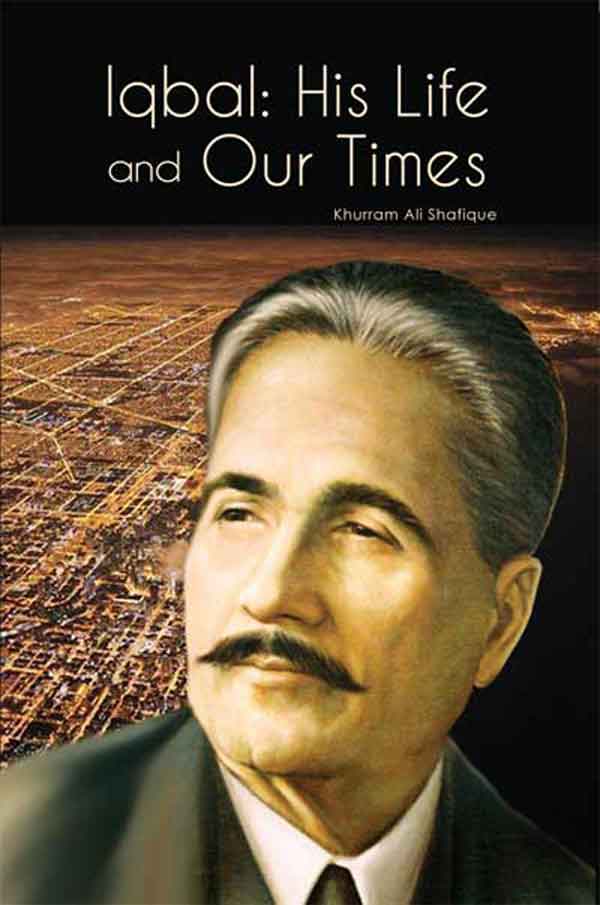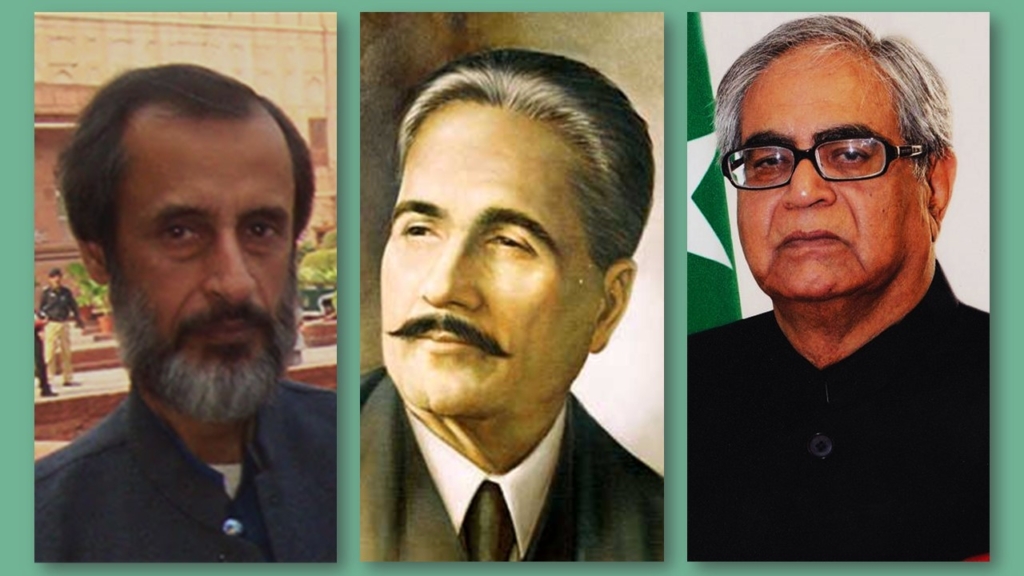‘Iqbal: His Life and Our Times fulfils the need for a simple and reliable introduction to the life and work of this unmatched genius, highlighting the practical relevance of his ideas for those who wish to consider them for implementation.’
This write-up from the renowned poet and scholar Iftikhar Arif and M. Suheyl Umar, former director Iqbal Academy Pakistan, forms the ‘Introduction’ in Iqbal: His Life and Our Times (2014) by Khurram Ali Shafique.
 Dr Sir Muhammad Iqbal (1877-1938) is the only poet and thinker in the history of world literature who has been credited with the birth of a new nation and a new state. It is therefore very befitting that a handbook about his life and thought should be brought out by an organization comprising ten member states. The Economic Cooperation Organization’s Cultural Institute (ECI) is pleased to bring out this publication jointly with Iqbal Academy Pakistan.
Dr Sir Muhammad Iqbal (1877-1938) is the only poet and thinker in the history of world literature who has been credited with the birth of a new nation and a new state. It is therefore very befitting that a handbook about his life and thought should be brought out by an organization comprising ten member states. The Economic Cooperation Organization’s Cultural Institute (ECI) is pleased to bring out this publication jointly with Iqbal Academy Pakistan.
In addition to his unique status in Pakistan, Iqbal also happens to be either a national poet or a household inspiration in several other countries including Iran, Tajikistan, Kazakhstan, Kyrgyzstan, Turkmenistan, Uzbekistan and India. In Turkey, his symbolic grave stands in the compound of the mausoleum of Maulana Jalaluddin Rumi. In the universities of Heidelberg and Cambridge, there are chairs or fellowships in his name. Roads, buildings and monuments have been named after him in other countries too, including Mauritius.
Iqbal: His Life and Our Times fulfils the need for a simple and reliable introduction to the life and work of this unmatched genius, highlighting the practical relevance of his ideas for those who wish to consider them for implementation. The author, Khurram Ali Shafique, is well known in the field of Iqbal Studies. The awards that he has received for his previous publications include the coveted Presidential Iqbal Award.
The present volume includes many findings that are the outcome of the author’s original research. Of special interest to general readers as well as to experts would be the evidence, presented here for the first time, which establishes a historical connection between the political ideas of Iqbal, the American thinker Mary Parker Follett and the Bengali visionary, C. R. Das. We are hoping that this volume will offer much by way of looking at present times from new avenues:
- it is shown here that the views expressed by Iqbal in his poetry and prose formed a coherent system of thought, and the same was implemented by him through political and social action; this is to dispel a myth that has been preventing a deeper understanding of Iqbal’s thought until now, i.e. the false but widely perpetuated assumption that the ideas presented by Iqbal were either inconsistent with each other or they underwent so many changes during his life that they cannot be considered for implementation in any other time;
- this system of thought and its underlying principles are being presented here, perhaps for the first time;
- it is also being shown that in spite of its inner coherence, the system of Iqbal’s thought kept pace with the evolution of the collective life of his community;
- this evolution can be studied by dividing the intellectual life of the poet-philosopher into three stages: inquiry, discovery and transcendence; the duration of each stage has been established here on the basis of biographical and textual evidence, and the book has been divided into three chapters accordingly;
- each of these three stages started in his mental life when his community adopted a new goal collectively; the goals, their relevance to the world and humanity, their implications for Iqbal, and his contribution towards achieving them are issues that are being discussed here in a fresh light; and this may turn out to be one of the most significant contributions that this book will make to the subject.
If the nations of the world desire to come closer in their hearts and minds, they cannot afford to ignore learning about the ideas, emotions and visions of one another. The Economic Cooperation Organization (ECO) is an intergovernmental regional organization established in 1985 by Iran, Pakistan and Turkey for the purpose of promoting sustainable economic, technical and cultural cooperation among the member states, which now include also Afghanistan, Azerbaijan, Kazakhstan, Kyrgyz Republic, Tajikistan, Turkmenistan and Uzbekistan. It is the successor organization of Regional Cooperation for Development (RCD) which remained in existence from 1964 to 1979. The Organization’s Cultural Institute (ECI), formed through a charter at the third summit meeting of the countries of ECO held at Islamabad in 1995, aims at fostering understanding and the preservation of the rich cultural heritage of its members through common projects in the fields of media, literature, art, philosophy, sport and education.
The present volume is being offered in line with this vision, and with the conviction that it is important for everybody to be informed about the ideas of Iqbal, since they may be counted among those cultural forces that have gone into shaping a significant part of our world.
This conviction is shared by Iqbal Academy Pakistan, a statutory body of the Government of Pakistan, originally established through an act of parliament in 1951 and reinforced through an ordinance in 1962. The aims and objectives of the Academy are to promote and disseminate the study and understanding of the works and teachings of Iqbal. The Academy has been translating its objectives into action through a number of measures including publication programmes, IT projects, outreach activities, the Iqbal Award Programme, websites, research and compilation, audio-video, multimedia, archive projects as well as exhibitions, conferences, seminars, projection abroad, research guidance, academic assistance, donations and library services.
We hope that readers will benefit from the book that we are offering here jointly, and that this will go a long way in achieving our common objectives.
Iftikhar Husain Arif
President,
ECO Cultural Institute,
Tehran
Muhammad Suheyl Umar
Director,
Iqbal Academy Pakistan, Lahore
Find our more about Iqbal: His Life and Our Times or purchase it online
